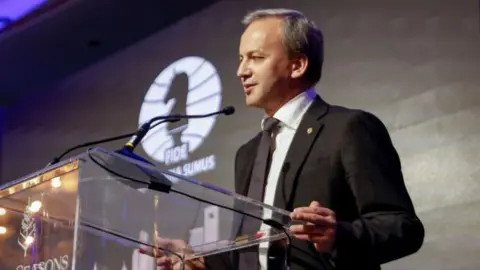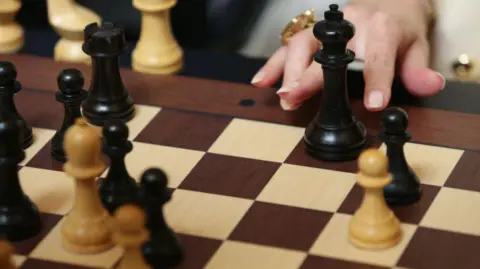Russia squares up to Ukraine in battle for control of chess
 Getty Images
Getty ImagesRussia’s brutal war against Ukraine has now spilled over on to the world of chess.
Following Moscow’s full-scale invasion in 2022, the International Chess Federation (Fide) voted to ban the Russian national team and officials from competitions.
For a country with a history of dominance in chess, it was a bitter blow. But now, the Kremlin is fighting back.
A vote at next week's Fide general assembly in Budapest could fully reinstate Russia in international chess competitions.
The Ukrainians, supported by allies from England, Germany and other nations, are trying to stop them.
“Russia’s control of Fide is absolute,” says Malcolm Pein from the English Chess Federation.
Fide's president is a former Russian deputy prime minister, Arkady Dvorkovich, and Mr Pein speaks of Moscow staging a slow takeover of the federation, by making changes to its constitution, affecting the way decisions are made.
“We have a sort of a manifestation of what used to be known in Soviet days as a ‘power vertical,’” he explains. “Any vote that Russia wants passed always gets passed.”
Fide is affiliated to the International Olympic Committee and Malcolm Pein wants the IOC to exert pressure on the federation to maintain sanctions against Russia.
The motion to lift all sanctions against Russia has been tabled by the Chess Federation of Kyrgyzstan, a key Russian ally in Central Asia.
However, other countries are expected to support Moscow at the Fide congress too.
German Chess Federation head Ingrid Lauterbach says every federation has one vote and that many states in Africa and Asia are "easy to be influenced to vote in [Russia’s] favour".
"You can see [pro-Russians] are trying to take over. It’s really worrying."
In a separate move, a Fide commission applied sanctions to the Russian Chess Federation (CFR) last June, excluding it for two years for “bringing chess into disrepute" and violating the international organisation's principles.
It found that the Russian federation had organised tournaments in areas of Ukraine illegally occupied by Russian forces and reprimanded Fide's Russian president for his membership of the CFR board.
Ex-defence minister Sergei Shoigu and Kremlin spokesman Dmitry Peskov, who are both under international sanctions, are also board members.
Arkady Dvorkovich said at the time that many of his colleagues on the Fide council disagreed with the ban on the federation and it would be appealed. "Of course, the assembly cannot fail to consider such a significant issue for the entire world chess movement," he told Match TV.
But next week’s crucial vote at the Fide General Assembly concerns separate sanctions applied in 2022 – namely, the exclusion of the Russian national chess team, flag, anthem and officials from all international chess events.
 Getty Images
Getty ImagesUkraine's bid to stop Russia taking control of the global chess body goes right to the top.
President Volodymyr Zelensky has given the task to his adviser on strategic affairs, Alexander Kamyshin, who made his name at the start of the war for keeping Ukraine's railways on track despite repeated attack.
“I was quite surprised with this vote in Budapest,” says Mr Kamyshin, who is the new head of the Ukrainian Chess Federation.
“We’ve had 21 chess players killed in this war. It’s not fair to raise this issue in the agenda while Russia is killing our civilians, our chess players in Ukraine.”
The Russian Chess Federation and Arkady Dvorkovich have declined to comment to the BBC, although Russian officials have called the decision to sanction the RCF “deliberately political and unsportsmanlike”.
Malcolm Pein fears that if Russia is let back into the chess fold, it would be a "huge propaganda coup".
“They'll be able to point to it and say, look, we've been allowed back into chess. They could demonstrate to their citizens they don't have to suffer as many privations as they should be suffering because of the war."
For Ukraine and its Western allies, chess is just one element of their campaign to maintain sanctions pressure on Russia across the board.
But after two and half years of war, the calls for Moscow to be welcomed back into the international community are growing louder.
